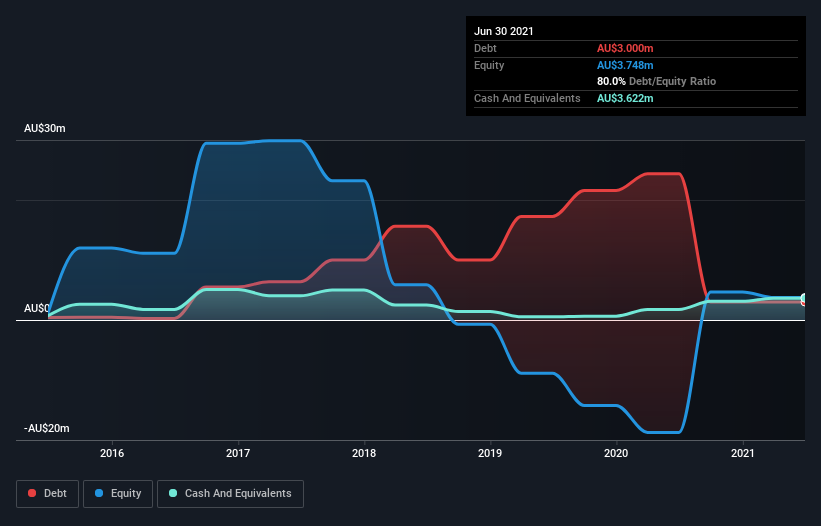Is Pureprofile (ASX:PPL) Using Debt In A Risky Way?
The external fund manager backed by Berkshire Hathaway's Charlie Munger, Li Lu, makes no bones about it when he says 'The biggest investment risk is not the volatility of prices, but whether you will suffer a permanent loss of capital.' It's only natural to consider a company's balance sheet when you examine how risky it is, since debt is often involved when a business collapses. As with many other companies Pureprofile Ltd (ASX:PPL) makes use of debt. But is this debt a concern to shareholders?
When Is Debt Dangerous?
Debt is a tool to help businesses grow, but if a business is incapable of paying off its lenders, then it exists at their mercy. Ultimately, if the company can't fulfill its legal obligations to repay debt, shareholders could walk away with nothing. However, a more common (but still painful) scenario is that it has to raise new equity capital at a low price, thus permanently diluting shareholders. Of course, debt can be an important tool in businesses, particularly capital heavy businesses. When we examine debt levels, we first consider both cash and debt levels, together.
View our latest analysis for Pureprofile
What Is Pureprofile's Net Debt?
As you can see below, Pureprofile had AU$3.00m of debt at June 2021, down from AU$24.4m a year prior. But it also has AU$3.62m in cash to offset that, meaning it has AU$621.7k net cash.
How Healthy Is Pureprofile's Balance Sheet?
Zooming in on the latest balance sheet data, we can see that Pureprofile had liabilities of AU$10.8m due within 12 months and liabilities of AU$4.86m due beyond that. Offsetting this, it had AU$3.62m in cash and AU$6.39m in receivables that were due within 12 months. So its liabilities total AU$5.64m more than the combination of its cash and short-term receivables.
Of course, Pureprofile has a market capitalization of AU$33.9m, so these liabilities are probably manageable. Having said that, it's clear that we should continue to monitor its balance sheet, lest it change for the worse. While it does have liabilities worth noting, Pureprofile also has more cash than debt, so we're pretty confident it can manage its debt safely. When analysing debt levels, the balance sheet is the obvious place to start. But ultimately the future profitability of the business will decide if Pureprofile can strengthen its balance sheet over time. So if you want to see what the professionals think, you might find this free report on analyst profit forecasts to be interesting.
Over 12 months, Pureprofile reported revenue of AU$30m, which is a gain of 24%, although it did not report any earnings before interest and tax. With any luck the company will be able to grow its way to profitability.
So How Risky Is Pureprofile?
Although Pureprofile had an earnings before interest and tax (EBIT) loss over the last twelve months, it made a statutory profit of AU$2.8m. So taking that on face value, and considering the cash, we don't think its very risky in the near term. The good news for Pureprofile shareholders is that its revenue growth is strong, making it easier to raise capital if need be. But we still think it's somewhat risky. There's no doubt that we learn most about debt from the balance sheet. However, not all investment risk resides within the balance sheet - far from it. We've identified 4 warning signs with Pureprofile (at least 2 which don't sit too well with us) , and understanding them should be part of your investment process.
At the end of the day, it's often better to focus on companies that are free from net debt. You can access our special list of such companies (all with a track record of profit growth). It's free.
This article by Simply Wall St is general in nature. We provide commentary based on historical data and analyst forecasts only using an unbiased methodology and our articles are not intended to be financial advice. It does not constitute a recommendation to buy or sell any stock, and does not take account of your objectives, or your financial situation. We aim to bring you long-term focused analysis driven by fundamental data. Note that our analysis may not factor in the latest price-sensitive company announcements or qualitative material. Simply Wall St has no position in any stocks mentioned.
Have feedback on this article? Concerned about the content? Get in touch with us directly. Alternatively, email editorial-team (at) simplywallst.com.

